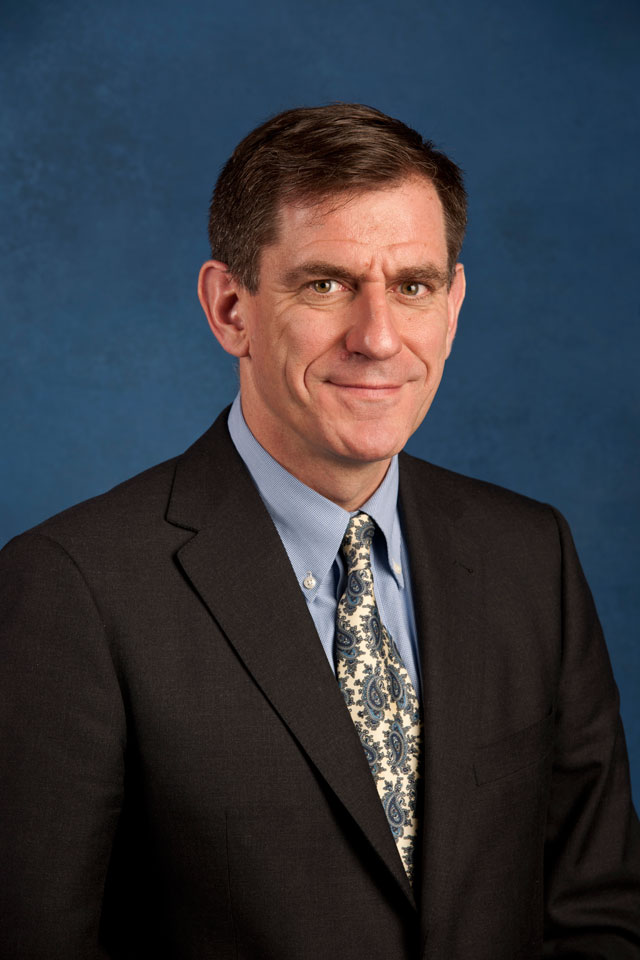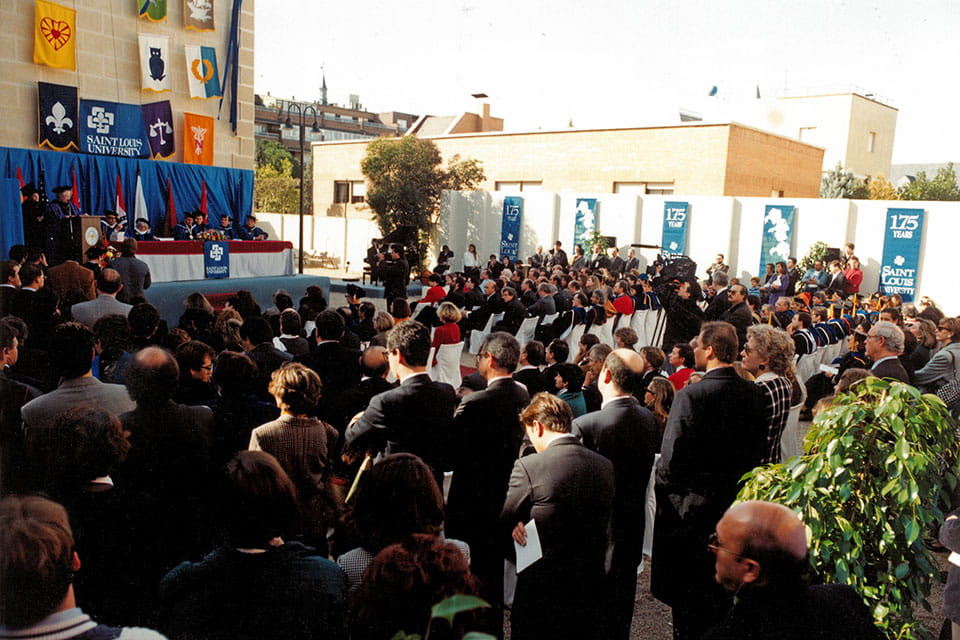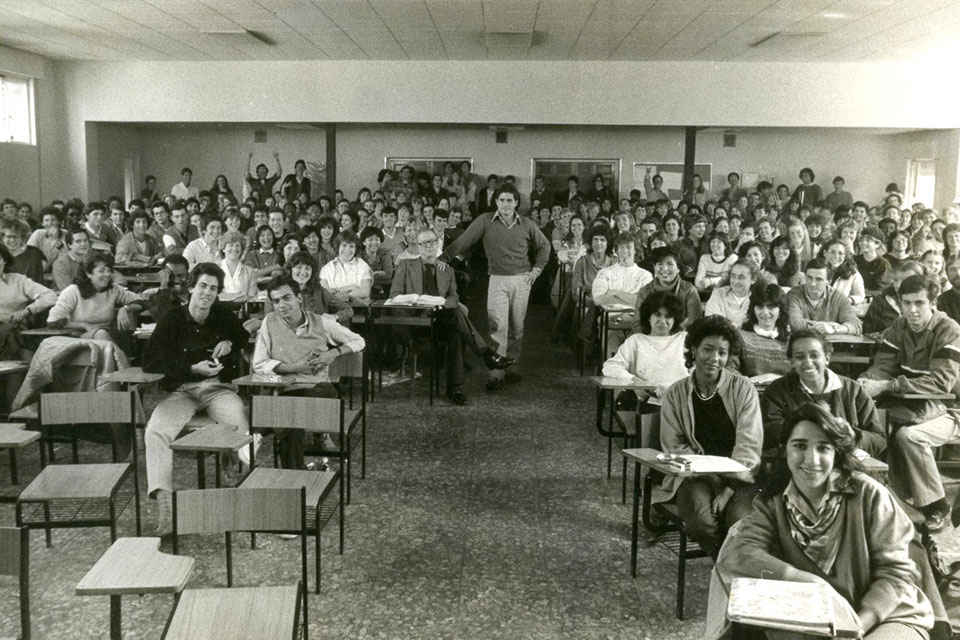50 Years of Teaching ‘Global’ Billikens: SLU-Madrid Looks Forward as it Celebrates Half a Century
In Spain, Billikens from more than 50 countries are following in the footsteps of St. Ignatius of Loyola, both literally and educationally at Saint Louis University’s Madrid campus.
As SLU-Madrid celebrates its 50th anniversary this year, supporting students as they pursue truth and develop as men and women for others is very much on the minds of the Madrid campus’s faculty and staff.
“Jesuit education has always been global,” Paul Vita, Ph.D., director and academic dean of SLU-Madrid explained, “not rooted to a specific country or place. And part of ‘setting the world on fire’ can mean discovering it by going to and living in another place.”
SLU-Madrid was among the first American universities to open a permanent campus in Europe. Raymond Sullivant, S.J., launched SLU’s study abroad program in Madrid in 1967. At that time, Spain was a country rich in traditions but not considered a major tourist destination for Americans. Students who enrolled in the new Madrid program remained abroad for a full year, immersed in language courses and living in colegio mayores with Spanish students. The young Americans, however, were witnessing a country undergo a transition from dictatorship to democracy as the rule of General Francisco Franco began to come to an end.

“Alums of SLU-Madrid share countless stories of Father Sullivant,” Vita said. “He was strict, but compassionate, energetic and fiercely committed to student learning. He fined students when they slipped into English and warned them to keep away from political protests. It must have been an incredible experience to be in Spain during the 1970s and the alumni I’ve met tell me that their year in Spain was not only their best in college, but the best year of their lives.”
Five decades later, SLU-Madrid continues to provide students with life-changing experiences.
The campus is close to where Sullivant originally opened it in the residential neighborhood of Metropolitano. However, it’s no longer housed in a few rented classrooms. Over the past two decades, the University purchased three buildings and expanded. Its facilities now include more than 20 state-of-the-art classrooms, a library, art and music studios, computer, nursing and science labs and a cafeteria. Over 100 professors serve on its faculty, offering courses that range from aviation science to Islam.
Madrid’s vibrant city scene is a key attraction as is the possibility of completing an American undergraduate degree in Europe.
“SLU-Madrid also extends SLU’s Jesuit values and liberal arts programs to students who would not have the resources or even the legal right to step into the U.S,” Vita said. “It’s also an extraordinary option for U.S. students, completing a full SLU degree overseas.” The University’s long history of excellence and Jesuit rigor in education, Vita noted that Sullivant’s vision for a permanent European campus was novel in his day. That novelty is still fresh 50 years later, he said.
SLU-Madrid is also unique among Spain’s universities, Vita explained, because of its liberal arts model of education.
“European universities are undergoing changes that align them to the U.S. liberal arts model of education,” Vita pointed out. “However, many of their programs lack the flexibility that is one of the hallmarks of a U.S. liberal arts degree, where a student has the option to change a major, pick up a second or third minor, or take electives in disciplines outside of their area of study.” Like their colleagues in St. Louis, SLU-Madrid’s faculty share in the responsibility of making sure that students are held to a high level of academic rigor. They also share in the responsibility of providing students with the distinctly “SLU” educational experience.
The SLU-Madrid community’s commitment to SLU’s Jesuit mission and values also make the campus a standout. Being a global Billiken, as SLU-Madrid teaches, means stepping out from behind the tourist map and into the lives and issues impacting others. Both degree-seeking and visiting students have opportunities to serve Madrid’s local community, by offering free English classes in the Community ESL Program; volunteering at local hospitals; and soup kitchens and feeding and getting to know the homeless through the program BocaTalk.
To commemorate its 50th anniversary, SLU-Madrid hosted a special celebration for alumni in June 2017. University President Fred P. Pestello, Ph.D., and Frances Pestello, Ph.D., were on hand for the party along with SLU alumni from each of the Madrid campus’s five decades. A delegation from SLU-Madrid joined their St. Louis-based SLU community at the University’s bicentennial kick off Mass under the Arch on Saturday, Sept. 24, 2017. A larger anniversary celebration in Madrid, is planned for March 7, 2018, that will include a special Mass, an academic ceremony awarding distinguished Spaniards honorary degrees and campus-wide celebration.
Saint Louis University is a world-class Catholic, Jesuit institution educating nearly
13,000 students on two dynamic, urban campuses - in St. Louis, Missouri, and Madrid,
Spain. Founded in 1818, the University will soon celebrate its bicentennial.
With a legacy of innovative academics and research, compassionate health care and
faithful service, Saint Louis University attracts a diverse community of scholars
who push intellectual boundaries in pursuit of creative, meaningful ways to impact
the world, striving to serve a higher purpose and seek a greater good.



















